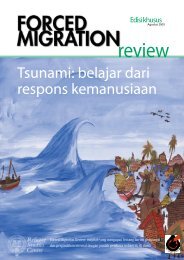FMR 42 full issue pdf - Forced Migration Review
FMR 42 full issue pdf - Forced Migration Review
FMR 42 full issue pdf - Forced Migration Review
You also want an ePaper? Increase the reach of your titles
YUMPU automatically turns print PDFs into web optimized ePapers that Google loves.
<strong>FMR</strong> <strong>42</strong><br />
Sexual orientation and gender identity and the protection of forced migrants 55<br />
Prior to the new outreach approach, few lesbian<br />
women came forward for assistance but since<br />
the satellite offices became operational, more<br />
than 40 lesbian refugees have approached the<br />
NGO. With some women facing additional<br />
barriers in accessing transport money or<br />
requiring permission from their husband or<br />
another male family member to leave their<br />
homes, the proximity of the satellite offices has<br />
made protection more accessible. The success<br />
of this outreach has shown the importance<br />
of conducting pro-active outreach, locating<br />
services in areas accessible to refugees<br />
and being flexible about appointments.<br />
A number of LGBTI refugees in Kenya<br />
are engaged in survival sex. Outreach,<br />
identification and referral work therefore also<br />
needs to take place in areas where sex workers<br />
congregate. Kenyan LGBTI organisations<br />
currently conduct health awareness<br />
sensitisation among LGBTI sex workers which<br />
could be expanded to include sensitisation<br />
on protection <strong>issue</strong>s for LGBTI refugees<br />
and asylum seekers involved in sex work.<br />
Safe shelter<br />
Another example of good practice from Kenya<br />
is the provision of safe shelter for a limited<br />
number of at-risk LGBTI refugees. While steps<br />
should be taken to make existing safe houses<br />
(such as those for victims of gender-based<br />
violence) safe for all, an NGO has established<br />
a specific scattered-site housing programme<br />
for LGBTI refugees who face heightened risks<br />
while they wait to be resettled. Instead of<br />
accommodating individuals in a single safe<br />
house, this programme enables individual<br />
refugees to identify a safe place to stay and<br />
covers the cost of rental for a temporary<br />
period. Many such refugees choose to stay<br />
in locations away from where most other<br />
refugees live as this affords them a greater<br />
degree of anonymity. This approach also<br />
helps to avert concerns that a single safe<br />
house for LGBTI refugees could become<br />
a target for harassment or violence.<br />
Psychosocial support<br />
Many LGBTI refugees find themselves without<br />
a social support system because they fear<br />
harassment or violence if they reveal their<br />
sexual orientation or gender identity. This<br />
isolation contributes to some LGBTI refugees<br />
forming dependent and often abusive relations<br />
with a single person as a source of support<br />
in exchange for providing menial work or<br />
sexual favours, and may contribute to the<br />
high rates of post-traumatic stress disorder<br />
symptoms found in this population.<br />
In Nairobi, an NGO holds regular group<br />
counselling sessions run by the refugees<br />
with the guidance of a senior counsellor.<br />
The existence of the group mitigates feelings<br />
of isolation and serves as a support group<br />
where problems and solutions are discussed<br />
and shared. Individual counselling is also<br />
provided by the NGO, focusing on selfacceptance<br />
and help in distinguishing societal<br />
hostility from one’s own perceptions of<br />
sexual orientation and gender identity. This<br />
enables LGBTI refugees to make informed<br />
decisions about the degree to which they<br />
may resist social pressures to conform, builds<br />
their resilience and sense of self-worth, and<br />
increases their sense of control over their<br />
lives. Social events arranged by the local<br />
LGBTI community also offer opportunities<br />
for developing a local social network.<br />
Training<br />
For the past three years, the same NGO has<br />
been conducting training for UNHCR staff<br />
and its international partners in Nairobi on the<br />
diverse ways in which LGBTI refugees may<br />
represent their sexual orientation and gender<br />
identity as well as addressing internalised<br />
and institutionalised homophobia and<br />
transphobia amongst UNHCR and NGO staff.<br />
The training has contributed to an increased<br />
awareness of the specific needs of LGBTI<br />
refugees and has also helped challenge and<br />
combat individual and institutional prejudice<br />
among staff. Continuous support for such<br />
training is needed as processes addressing<br />
prejudice require long-term commitments.<br />
As part of its Invisible in the City research,<br />
HIAS plans to <strong>issue</strong> a guide detailing best<br />
practices for working with LGBTI refugees to<br />
serve as a basis for further regional training.




